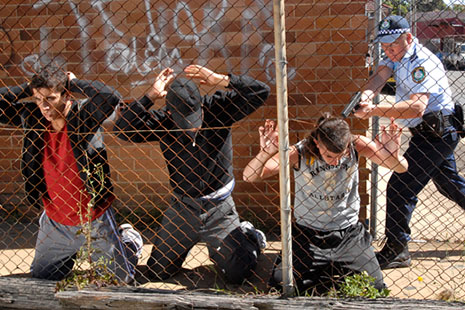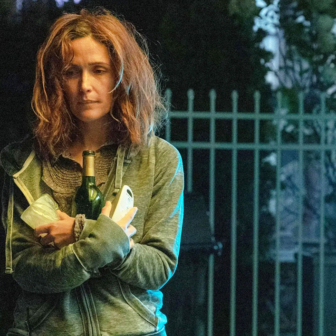IN ARGUMENTS around movies, there will always be someone telling someone else to take the film on its own terms; don’t ask a Western to be a contemporary suburban soap, don’t ask the soap to be a documentary. But it’s not always that easy; people do read themselves into Neighbours, their neighbours into Kath and Kim; and the boundaries keep on blurring. There are still, and lucky for us, great examples of classical narrative (from the past year or so, The Painted Veil and Gran Torino); outside its field, drama, fiction, documentary and film-essay shade into each other. We go to all of them looking for strangeness, wanting to be surprised, and wanting also to have what’s familiar played back. When Jean-Luc Godard said that “cinema is truth twenty-four times a second” he wasn’t talking about the photographic registration of material facts, but about what the complex organisation and re-organisation of sounds and images makes possible for imagination, empathy, insight.
And there has to be some recognisable sense in which it’s happening here, as well as in the many elsewheres of our world. A long time ago – say 1960s to 1980s – the quarrelsome, often impassioned campaign for Australian film production had to do with ideas about national identity. That was rather quickly worn out, if not positively discredited, by the genteel conformism of the costume dramas; Picnic at Hanging Rock and Gallipoli were really the same thing, the striving, ultra-composed Australian art-film. There were lots more, alas, and I remember one of my no-nonsense middle-aged students asking in honest wonder: “Why is it that with Australian feature-films there’s always something missing?” We thought the genteel phase was over, but then came that anxious concoction Jindabyne (Aborigines compulsory) trailing miserably in its wake. The cure for all of them may lie in forgetting nationality, thinking locally, and perhaps putting the genre-boundaries into indefinite suspension. From those early 80s, dominated by Gallipoli and national fine feelings, one Australian film I’d keep would be The Wrong Side of the Road, which was doco, drama, road- and music-movie all in one.
All that came back with the cinematic impact of The Class, which could have been titled as it was in French, Entre les Murs, directed by Laurent Cantet. Inside the walls of a co-ed classroom somewhere in the 20th arrondissement, on the un-privileged eastern outskirts of Paris, a group of gutsy, insubordinate teenagers make every day a noisy, often violent obstacle race for their teacher (François Begaudeau, who wrote the book and script from evident lived experience). He lets them get to him a bit too often; his tactical mistakes are as visible to us as the kids’ untameable energy. We stay inside the room, where the mini-dramas of rivalry, challenge, notes passed or thrown, shrugs, nudges, minor and major insolence are caught at close quarters, edited for body-language and maximal tension, boy to girl and back, under the desks and over them, pupil to teacher and back. The students are black African, Algerian, Asian, white French, Muslim and whatever else – as a gang, they make Australian multiculturalism feel a bit pale. When one recalcitrant African lad is threatened with expulsion, we learn from his mates that he could be sent back to Mali, where he has no future. There’s a teachers’ meeting, where they vote on that issue. We’re allowed to see the edges of tragedy, of the desperate refugees’ world, just past the limits of the screen; and those intimations are the more powerful because the film keeps so tight a grip on what’s immediate.
The Class is enacted, but in a way that suggests the young performers in the room are playing very close to their actual lives, so that the film inhabits the wide, unfenced area between documentary and fiction. Media discussion around The Combination led me to expect something similar; I thought the strife among the Lebanese/Australian lads of Sydney’s west would have been filmed at close range, and the audience thus kept visually embroiled. Nothing of the kind; The Combination is just as closely grounded in a real geography, but it is classical drama at every point. Also at every point, and to the great credit of those most concerned, it is cinema. The storyline may indicate the drama; it doesn’t suggest the scope, the wholeness, of the way things are seen.
John (George Basha) is newly out of gaol, determined on a new life; but his younger brother Charlie (Firass Dirani) won’t stay out of trouble. His schoolyard brawling tangles with that of street gangs, and the machinations of drug dealers; a very nasty Mr Big is shadowed by a properly huge Oddjob straight out of Ian Fleming. There is a mother, brilliantly played by Doris Younane; an Anglo-Australian girlfriend called Sydney (Clare Bowen), and around them a landscape of ostensibly sedate suburban houses, raucous streets, a boxing gym, a club. At one point, the family looks at TV footage of the Cronulla riots; the vicious xenophobia played out there is enacted, differently, by Sydney’s improbably respectable parents. There’s a lot of dancing, spreads of Lebanese food, as well as gunplay, open racism, murder and rough justice. The last has to be delivered by John alone. The home, the family – with the women all in black – is haven, virtue, warrior’s rest.
Stereotypes, gangster film conventions, played out according to the book? Yes. David Field, the director – who has great form as an actor – knows his Scorsese all right, and I think his Shakespeare too. While Australian film work could do with the kind of enacted ethnography which gives The Class its explosive life, The Combination is transmitting cultural/ethnic difference from somewhere darker, somewhere further back, seeming to say: Face this first.
Out there, we’re pre-Obama; it won’t do. I wanted to call out to Lebanese/Australian feminists – knowing there are plenty of them – please work up your own scripts, and soon. Then later, reading how George Basha and David Field had had to struggle six years to find backing for The Combination, I thought: whatever my feminist reservations, this is wrong. They are brilliant film-makers, and this divided, confused Australia needs what they can do.
At the cinema, there were three girls in the row behind me. They giggled, crunched chips, and clearly enjoyed the whole thing, with enormous pleasure when Mr Big was finally dealt with. Leaving, I saw that two of them were wearing head-scarves, while the third was not. Multiculturalism is challenged, middle-class feminism likewise; you can’t assume anything. •





